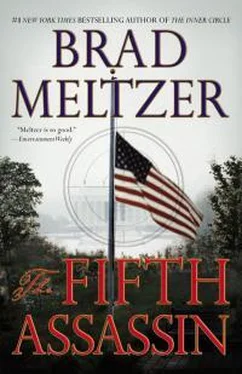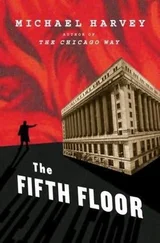“I’d like to see my room now.”
“You will, Nico. But first they want you in—”
“You’re not listening. I want to see my room ,” he growled. To make the point, Nico stopped in the hallway, refusing to move.
“Nico, I am so not in the mood for your nuttiness today. They’re waiting for us in TLC,” Rupert said, raising his voice as he referred to the Therapeutic Learning Center.
Nico still wouldn’t budge.
Rupert grabbed him by the biceps. “Can you for once not be a pain in my rear?” Tightening his grip, he added, “Y’know how many of us got fired to pay for this building? We used to have orderlies running the juice cart. Now I gotta do all that, plus haul you to TLC, plus —!”
“You need to let go of me,” Nico warned in a calm voice.
“Or what?” Rupert challenged, making sure Nico got a good look at the small electronic device—like a miniature walkie-talkie—that Rupert held in his left hand.
Nico had heard rumors that the new building would have those. To be used during patient transfers. It was called a “man-down system.” If a staffer dropped it, or their body went horizontal, an alarm would ring through the building, while the hallway’s cameras would immediately zoom in within twenty feet of the device.
Nico checked both ends of the hallway. Brand-new cameras—encased in unbreakable glass cubes—on each side.
Nico stayed silent. Two years ago, he would’ve jammed his thumbs in Rupert’s eye sockets and pressed hard enough to hear the pop in his brain. But Nico’s therapies… all the drugs… He was a new man now. A cured man, is what the doctors called him. Cured. With a soft exhale, Nico unclenched his shoulders. Even the dead First Lady didn’t argue.
Smiling and still holding Nico’s biceps, Rupert steered him up the—
“What do you think you’re doing !?” a southern voice shouted behind them.
Following the sound, Rupert and Nico spun to find a tall man with tight curly black hair and a fine gray wool suit. Around here, only doctors wore suits. And among those doctors, only this one wore a vintage 1950s King Kong tie.
“Rupert, you have half a second to get your hands off him !” Dr. Michael Gosling barked.
“Sir, you don’t understand,” Rupert pleaded, letting go of Nico’s bicep. “I was just taking him to TLC—”
Gosling’s hand shot out, gripping Rupert by his own bicep and tugging him aside, just out of Nico’s earshot. “Was he putting himself or anyone else in danger?” Gosling challenged in a tense, low voice.
“That’s not the point.”
“It’s always the point. We have rules here, Rupert—and first among them is, don’t put your hands on the patients… especially the ones who’re making actual progress.” Turning to Nico, Gosling forced a smile and added, “You okay, Nico?”
“I want to go to my room.”
Rupert could barely keep from rolling his eyes. Every doctor was careful with Nico, but Gosling was one of the few who built a career on it. A decade ago, Gosling had been the junior member on Nico’s team—and the doctor credited with persuading Nico to stop plucking his eyelashes and using them to form tiny crosses that only he could see.
These days, Gosling was one of the hospital’s top administrators, in charge of not just the new facility’s operations but also making sure it opened without incident. And though Gosling insisted that his vintage movie ties were a way to seem accessible to the patients, everyone knew that he preferred the King Kong tie over the others. That’s how he saw himself: King Kong. The biggest of them all.
“Take him to his room, then you can go to TLC,” Gosling told Rupert.
“I want my calendar, and my book too,” Nico said, his voice back to its usual steady monotone.
“We’ll get those both to you,” Gosling promised.
“ He will ,” the dead First Lady said. “ He means it. ”
Nico’s chocolate brown eyes, set so close together, stayed locked on Dr. Gosling.
“Keep up the beautiful progress,” Gosling added, patting Nico on the back and heading up the hallway.
“You’re supposed to take me to my room now,” Nico told Rupert.
“I heard him,” Rupert said as he led Nico toward the elevators.
“Let me know if there’s anything else you need!” Dr. Gosling called out.
Nico looked down at his watch. 9:25 a.m. The exact time Charles Guiteau shot President Garfield.
Nico’s lips curved into a thin smile. After all these years, he would finally have everything he needed.
13
Three minutes earlier
Foundry Church
Pastor Kenneth Frick wore a little digital monitor on his left shoe that counted his steps. Two hundred and twelve steps for him to get dressed, comb his sandy blond hair, and mix his Cheerios with blueberry yogurt in the morning. Twenty-three steps to get from his kitchen to the front door of his small Capitol Hill townhouse. Then the full 1,958 steps that it took him to walk the three miles from Capitol Hill to the front door of Foundry Church every morning. Unlike St. John’s, the site of last night’s attack, across the street from the White House, Foundry Church was in a struggling neighborhood, not one most people walk to.
The monitor wasn’t Pastor Frick’s idea. It came from the church’s insurance company, which for every step he (or any of his employees) took gave a wellness discount (up to a total of twenty thousand steps per month). If he expected his staff to do it, the pastor had to lead the way.
It was the same when he was a boy. He wasn’t from an overly religious family, yet Frick was the one who used to drag his mother to Sunday sermons, making him the only five-year-old in their poor Indiana town who could tie his own tie. Back then, Kenneth was drawn to the church because it was the only place his father wouldn’t lay hands on them. But as he got older, Frick was captivated by the mystery of the church—the way it could broaden life beyond what you can touch, feel, and grasp.
“Anybody here besides God?” Frick called out with the same old joke he used every morning. He knew the answer. Except for the custodian, he was always the first one in. Right at nine, which was now his custom.
It’d been barely four months since Frick—only an associate pastor in title—had been assigned to the church, taking over while the head pastor was traveling in New Zealand. Frick felt blessed to be selected, but it took him over a month to work up the courage to cancel the free fruit smoothies that brought in parishioners to the late Sunday service. This was still Lincoln’s Church. Wearing a digital monitor on your shoe for an insurance discount was one thing. Bribing people with fruit smoothies was another.
Down the main hallway, with the bathroom behind him, Pastor Frick entered the main office suite, made his way through the maze of desks, and headed for his office in back. Through the frosted glass doors, he could tell the lights were off inside. The glass was too old and thick to see anything else.
Every pastor has rituals. At 9:05, as he stepped into his office and the door closed behind him, Frick did what he did every morning: He hung his coat—always on the middle hook—grabbed his Bible off the bookshelf, and began his morning prayers. For nearly twenty minutes, he stood praying and looking out the wide glass window that was directly behind his antique maple desk. He could see the reflection of his round face and dimpled chin in the window.
On his left was a door that led to his private bathroom. It was usually open. This morning, for some reason, it was shut.
Frick didn’t give it a thought. In the midst of his prayers, he looked down at the digital counter on his shoe—not to count his steps, but to see what time it was.
Читать дальше











